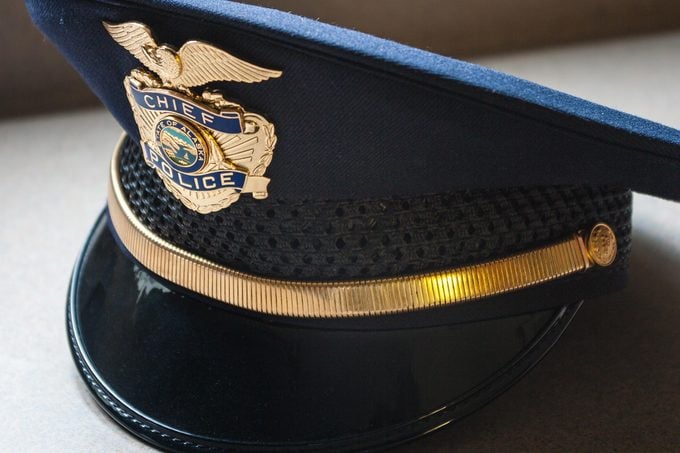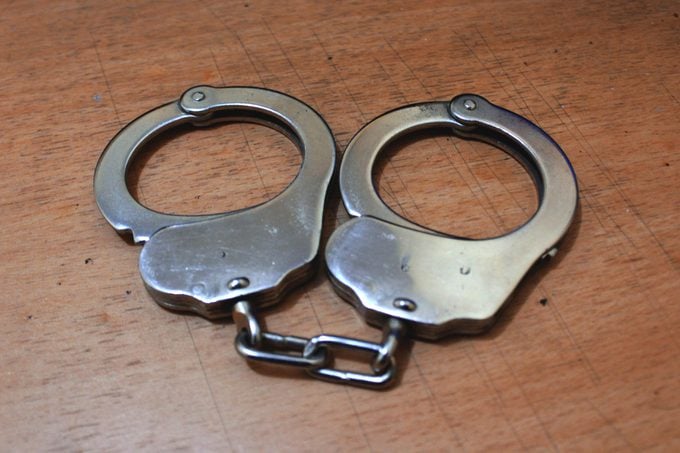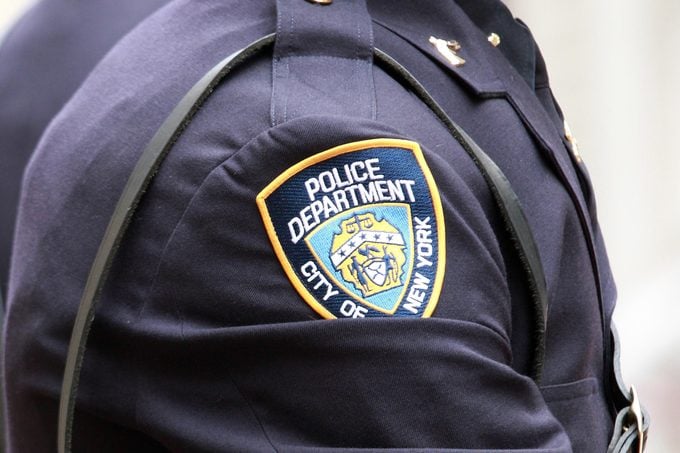14 Things Police Officers Don’t Want You to Know
Updated: Mar. 27, 2023
What you don't know could actually hurt you when it comes to these secrets police officers like to keep close to the vest.
They can and will lie to you
There are big consequences associated with lying to a police officer, including being prosecuted for obstruction of justice, which is a felony. But police officers can lie to civilians and do so routinely. For example, undercover police officers don’t have to admit they’re police officers even if you ask. Police officers can lie to you about having evidence against you. They can even lie to you about why they’re questioning you. In fact, lying in order to solve a crime is an integral part of police training and procedure. On the other hand, here are the things you should never say to a police officer.
But not all lies are acceptable
Not all lies by police officers are permissible, however. For example, a police officer isn’t allowed to identify himself as a member of the clergy in order to obtain a confession from a suspect. Nor is a police officer allowed to lie about how the legal system works. And while it’s OK for a police officer to claim, “we’re going to get a search warrant,” it’s not OK for him/her to say they have one when they don’t.
The beverage they’re offering you may be a ruse
The police can’t make you submit to a DNA test without a warrant. But that doesn’t mean they can’t offer you a glass of water while you’re sitting in a hot, stuffy investigation room and then obtain your DNA from the cup you drank from after you toss it in the trash. Once you toss something into the trash, it’s up for grabs even if it has your DNA on it. Don’t miss these 45 things police officers really do wish you knew.
“Your” garbage isn’t “yours”
It’s not just trash at the police station that’s fair game for extracting your DNA. It’s any trash, anywhere. So, that garbage you’re hauling out to the curb? Once you drop it on the curb, it’s no longer yours. And something in that garbage could become evidence against you, with or without a warrant.
They’ll go easy on you if you “confess”
It’s routine for police officers to promise that “things will be a lot easier” if you’d just confess to whatever you’re being accused of. And strictly speaking, that’s true: your confession makes a police officer’s job a lot easier. But it won’t change what you’re going to end up getting charged with. Only a prosecutor has the power to make that decision. And it won’t change what your punishment might be. That power lies with the judge and jury.
Nothing is “off-the-record”
When a journalist promises what you’re saying will be off the record, you should feel confident you won’t be reading what you said in tomorrow’s newspaper. But when a police officer tells you what you’re saying is “off-the-record,” they’re lying. Everything’s on the record. Everything you say can and will be used against you. In fact, if they haven’t already warned you as such, they will…when they arrest you. Until then, they have no obligation to warn you of your right to remain silent and your right to an attorney.
What “this is all about”
Police officers are under no obligation to tell you why they’re questioning you. Nor do they have an obligation to tell you they suspect you of something. Sure, you can ask, “what’s this all about, officer,” but they don’t have to tell you unless and until you’re actually being arrested. And not telling you is a procedural tactic designed to elicit more information than you’d offer if you knew “what this is all about.”
There’s a difference between an interview and an interrogation
An “interview” is a non-accusatory question and answer session between law enforcement and a witness, victim, or suspect. The goal of an interview is to obtain information. By contrast, an interrogation is an accusatory process, whose goal is eliciting a confession. Unless you’ve been arrested already, a police officer has no reason to tell you what sort of conversation you’re having, but you can assume you’re being interrogated if the conversation isn’t so much a series of questions and answers as a monologue by the police officer.
“Officer Friendly” isn’t really your friend
The job of a police officer is to enforce the law—not to be your friend. However, police officers are trained to use friendliness to elicit information. By engaging you in friendly chit-chat, a police officer can ascertain information not only about you but also about your community. So, let’s say you get pulled over for speeding on a Saturday night. If the officer asks you where you’re coming from, and you say “a party over on Elm Street,” the officer now knows there’s a party on Elm Street. You’ll want to know these 17 things about getting out of a speeding ticket.
You don’t have to invite them in
If the police show up at your door without a warrant (either search or arrest), you don’t have to invite them in. You don’t even have to talk to them, and you can ask them to leave. In fact, criminal lawyers advise that you don’t speak to them and ask them to leave. While you may think that it will appear you’re hiding something, and while it may even appear that you are, none of that is evidence of anything and can’t be used against you for any purpose.
You don’t have to stand on one leg…
…or close your eyes and touch your nose, or even take a breathalyzer test. If you’re pulled over for suspicion of driving under the influence of drugs or alcohol, you are not obligated to submit to any of these “field sobriety tests.” In fact, many criminal defense lawyers advise that you not submit to field sobriety testing because the results obtained can be used against you in a DUI proceeding. Yet field sobriety testing is notoriously inaccurate. All of that being said, if you refuse to submit to field testing you’ll likely be required to take a blood test.
You should ask if you’re free to leave
If a police officer approaches you and asks questions, ask them if you’re free to leave. If you’re free to leave, you’re not under arrest (yet), and you have no obligation to remain and answer questions. If you’re not free to leave, then you’re in custody, in which case, you shouldn’t be speaking or doing anything without consulting a lawyer.
Sometimes they break the law
“I exceeded the speed limit on my way home from work because I had trouble shedding the adrenalin that kicked in when I discovered that the man I handcuffed during a drug raid was sitting on a loaded 9mm pistol,” confesses police officer, Jill Wragg on Police Link, a law enforcement community blog. But don’t expect the law to come down hard on Wragg because the law rarely comes down hard on police officers—even in the case of shootings.
Ignorance isn’t innocence, and innocence isn’t absolution
Ignorance of the law doesn’t mean you haven’t broken the law, and there are laws you may be breaking on a regular basis without even realizing it. And just because you are, or believe you are, innocent, doesn’t mean you have nothing to worry about when you’re involved in a police investigation. Innocent people do go to prison, and so, it’s wise to consult a lawyer when you get pulled into an investigation.



